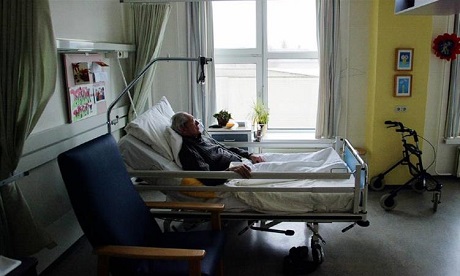Dementia patients in the Netherlands may be legally euthanised.
On April 22 the country’s highest court approved euthanising those who cannot express their wishes, so long as they have left an advance request in writing to say they wished to die.
The ruling comes after the court heard a case of a woman who resisted her euthanisation, even though she had written a directive four years prior, requesting the procedure in lieu of being put in a nursing home.
In the directive, she had said she wished to “be able to decide while still in my senses and when I think the time is right.”
Lower courts had previously ruled that the doctor being prosecuted for euthanising her had not acted improperly even though the woman had to be repeatedly sedated and physically restrained during the procedure.
Prosecutors at the Supreme Court argued that her attempt to fight off the doctor indicated that she could have changed her mind, but was unable to verbally communicate.
The Supreme Court concluded that “a physician may carry out a written request beforehand for euthanasia in people with advanced dementia,” providing other criteria on “unbearable and endless suffering” also were met.
After hearing the Supreme Court ruling, Cardinal Willem Eijk of Utrecht, who is the president of the Bishops’ Conference of the Netherlands, says the number of euthanasia cases will probably surge.
He is also concerned that the new ruling would also put Dutch doctors under pressure to euthanise patients.
“Patients and their relatives could think on the basis of the judgment … that there is a kind of a right to euthanasia in cases of advanced dementia with suffering, deemed without prospect (of recovery) and unbearable, though the Supreme Court does not say that and the law on euthanasia does not oblige a physician to perform euthanasia,” he says.
“Physicians of nursing homes therefore fear that they will be put under pressure by patients with dementia and their relatives to perform euthanasia as a consequence of the Supreme Court’s judgment”.
Eijk noted that in 2017, during the Lower Court prosecution of the doctor, the euthanasia rate fell by seven percent, but in 2019, following his acquittal, it rose by nearly four percent.
He also questioned whether the advance declaration could accurately express the actual will of a patient.
In his opinion, the new ruling created greater uncertainty rather than clarity over the practice of euthanasia.
“Instead of laying down criteria for interpreting the written euthanasia declarations of patients with advanced dementia, the Supreme Court leaves this to the judgment of the physicians involved, by which their uncertainty only grows.”
Source
